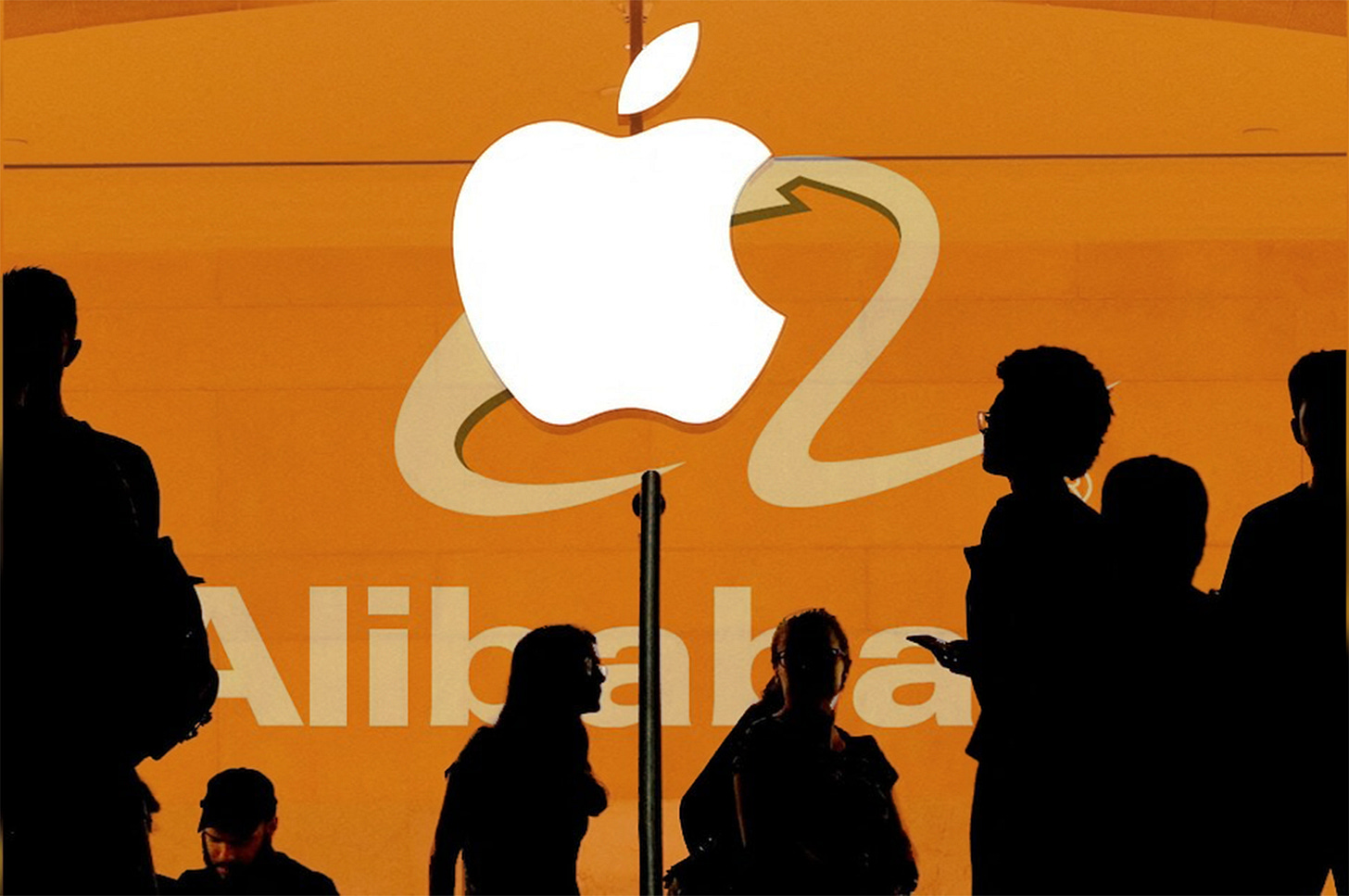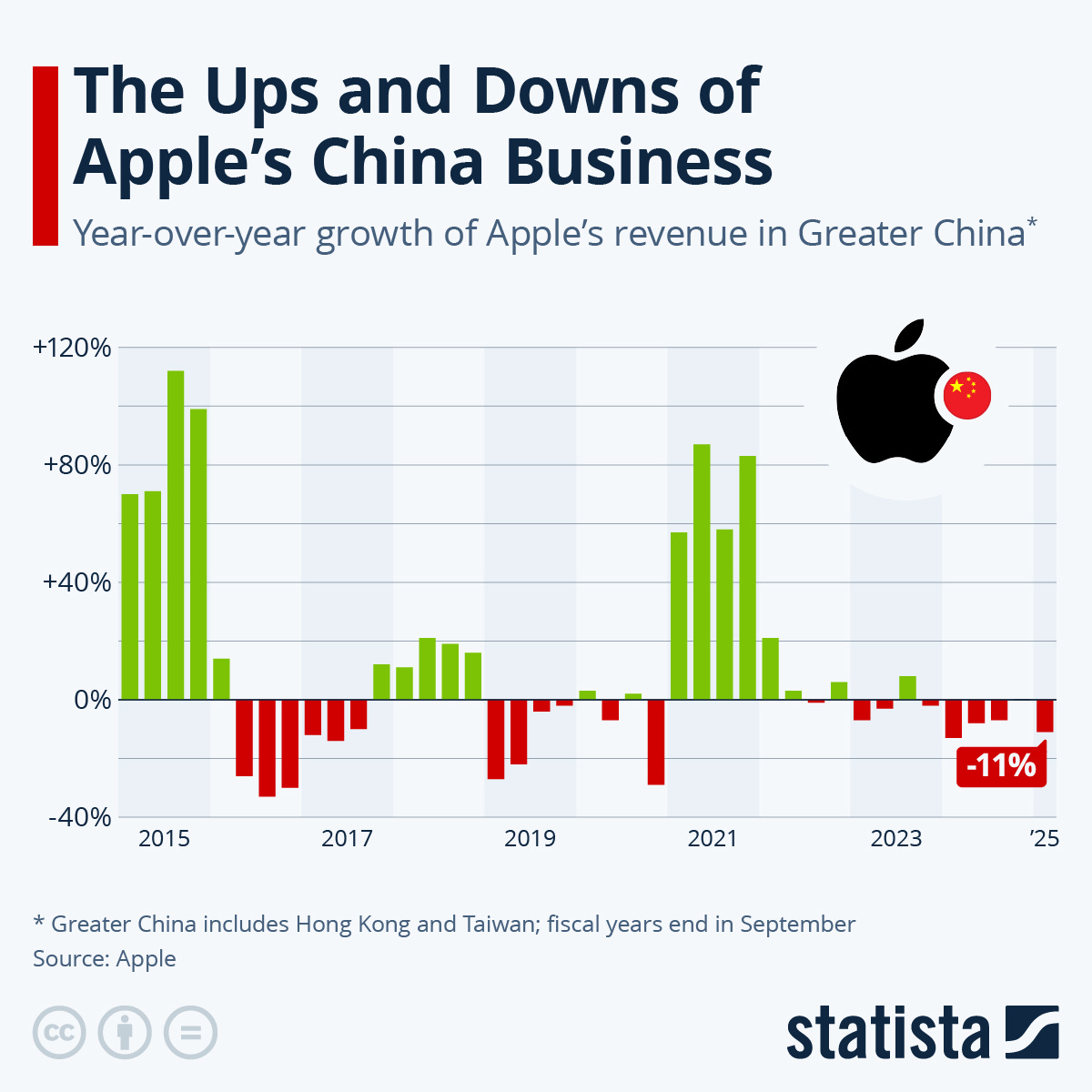Triple-A Tech
Why the new Apple/Alibaba tie-up is a win-win.
Alibaba will partner with Apple to develop AI features for iPhones in China, in news that was rumoured from earlier this week, which was confirmed to be true yesterday.
Both stocks gained off the news, with BABA up almost 10% this week, with AAPL a more tame 3%. We feel this is just the beginning, as if the deal can help to unlock China in a broader way for Apple, it can tap into the second most important market for it after the U.S. For Alibaba, it enables it to both diversify operations but also take a huge slice of the pie in a domestic AI arms race that’s heating up fast.
Today we run through the implications of the partnership in more detail, the size of the potential win-win, and how we’d position for this.
What We Know So Far
Over the past year, Apple has sought to bolster its AI offerings in China to remain competitive with local smartphone manufacturers that have aggressively integrated AI into their devices.
However, stringent Chinese regulations require foreign companies to collaborate with domestic firms for AI implementations. After evaluating several potential partners, including Baidu and DeepSeek, Apple selected Alibaba, with the news being confirmed on Thursday.
Alibaba will provide its AI technology to power various iPhone features in China. While specific functionalities have not been publicly detailed, the integration is expected to enhance applications such as voice recognition, natural language processing, and personalised user experiences.
Both companies have submitted the co-developed AI features to China’s Cyberspace Administration for approval. Still, there’s no indication yet as to a firm timeline of when this might start to be operational for users.
Apple’s China Problems
Apple recently released its latest results, showing that although top line revenue and profit beat expectations, performance out of China was a red flag (pardon the pun).
Revenue for the China region fell 11% to $18.5bn. This wasn’t just a quarterly anomaly. Apple experienced a 17% decline in annual smartphone shipments in China in 2024, marking its largest decrease since 2016.
Looking across the board, there are clear signs that China will need some focus from Apple going forward.
For example, the domestic market is a lot more competitive now. In the latest comparable quarter, Huawei’s sales increased by 15.5%, clearly eating away at some of Apple’s market share.
Both Huawei and Vivo have aggressively incorporated advanced AI features into their smartphones, but Apple is lagging behind in being able to bring the same comparable features to the Chinese market.
But why should Apple care about China as a market?
Simply put, China accounts for nearly 20% of global smartphone sales, making it the most significant single-country market for Apple outside the U.S. Looking forward, the scale of building out advanced 5G infrastructure as well as the growing urban population is likely only going to see this percentage increase in coming years.
Aside from the consumer angle, China is vital for Apple as far as manufacturing goes. It relies heavily on Chinese manufacturers like Foxconn, Pegatron, and Luxshare to produce hardware. The supply chain, alongside recent R&D investment, means that China is a growing hub that Apple is already integrated in, but needs to maintain and foster stronger ties to ensure it keeps the associated benefits.
Why This is a Win For Apple…
In partnering with Alibaba, Apple has pretty much solved the immediate problem around getting AI features onto iPhones in the country. That in itself is a huge plus, as we imagine a good number of consumers would currently be buying competitor products with this feature as a key consideration to purchase.
After doing a bit of digging, we found out that Alibaba’s LLM (Tongyi Qianwen) is specifically trained for the Chinese language, culture, and user behavior. In theory, this makes it more effective for local consumers than Apple's in-house AI.
While we don’t want to get too political here and read into things too much, aligning with Alibaba (a government-backed company) will help Apple maintain favour with Chinese regulators. So looking to the long-term, it could be a huge help for Apple when it comes to expanding AI features in the future (which is certainly the direction of travel as far as we’re concerned).
…But a Bigger One for Alibaba
The move in the stocks this week following the news is an early indication to us that Alibaba is the firm that stands to gain the most from this new partnership.
Given Apple’s significant market presence, the collaboration will introduce literally hundreds of millions of iPhone users to Alibaba’s AI ecosystem. That’s big.





